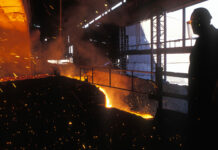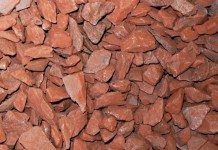
[miningmx.com] – KUMBA Iron Ore, the Anglo American subsidiary, could lose a portion, if not all, of its sales to ArceloMittal South Africa after the steel producer said today it wanted to renegotiate the price it pays for the mineral.
Paul O’Flaherty, CEO of AMSA, said in an interview following the group’s interim results announcement, in which headline earnings fell to R109m (2014H1: -R6m), that there was no take-or-pay obligation on the 6.5 million tonnes it bought from Kumba per year.
“We have been trying to get Kumba around the table to get a better price,” he said of the 60% above spot price – equal to $68/t – that AMSA pays for Kumba’s iron ore, calculated on a fixed cost basis.
“We are not obliged to buy it so we would look to import iron ore,” he said. Iron ore fell beneath $55/t earlier this week with some analysts saying that the cost of the mineral could fall to $45/t to $40/t amid significant supply growth.
Kumba Iron Ore announced on July 21 that it would pass the interim dividend following a difficult first half to its financial year in which free cash flow generation had fallen to R4bn compared to R14bn in the corresponding period of the 2014 financial year. It was also concerned about meeting covenants on existing debt if this situation persisted.
In its interim results notes, AMSA had earlier said that it “… currently operates in an environment where it does not benefit from low seaborne/global iron ore prices due to its current agreement with Kumba; this needs to be addressed urgently”.
O’Flaherty is also seeking tariff protection against cheap imports from the South African government in order to assist a sector that he said was under threat. He believed that the second half of AMSA’s financial year could see “fundamental change” in the sector.
AMSA said on July 23 that it would review its Vereeniging Works with “… a view to considering alternatives and deciding on whether mothballing some of its plants and placing others under care and maintenance would be a prudent decision”. The initial part of this process was expected to be completed by end-August.
“Import tariffs and designation of primary steel for localisation are key elements that need to be addressed by government in the short-term to ensure the sustainability of the domestic steel industry,” AMSA said in its interim notes.
“As stakeholders are aware, management has been working very closely with government to ensure that the South African steel industry is sustainable in the medium and long term,” it said.
“The company’s view is that excess global steel capacity, low global iron ore prices and low steel prices are the new reality and the company needs to change the way it operates in this environment,” it said.
Steel production in AMSA’s first half increased to 2.6 million tonnes, 177 000 tonnes higher than the comparative period.
This was owing to higher production output following the furnace reline at Newcastle and improved efficiencies at various plants.
However, the “constrained” steel market has resulted in total sales volumes being down by 7% (163 000 tonnes) to two million tonnes, against the comparative period.
“This was essentially driven by a 29% decrease in export sales, but was offset to some degree by a 2% increase in domestic sales,” said AMSA.











